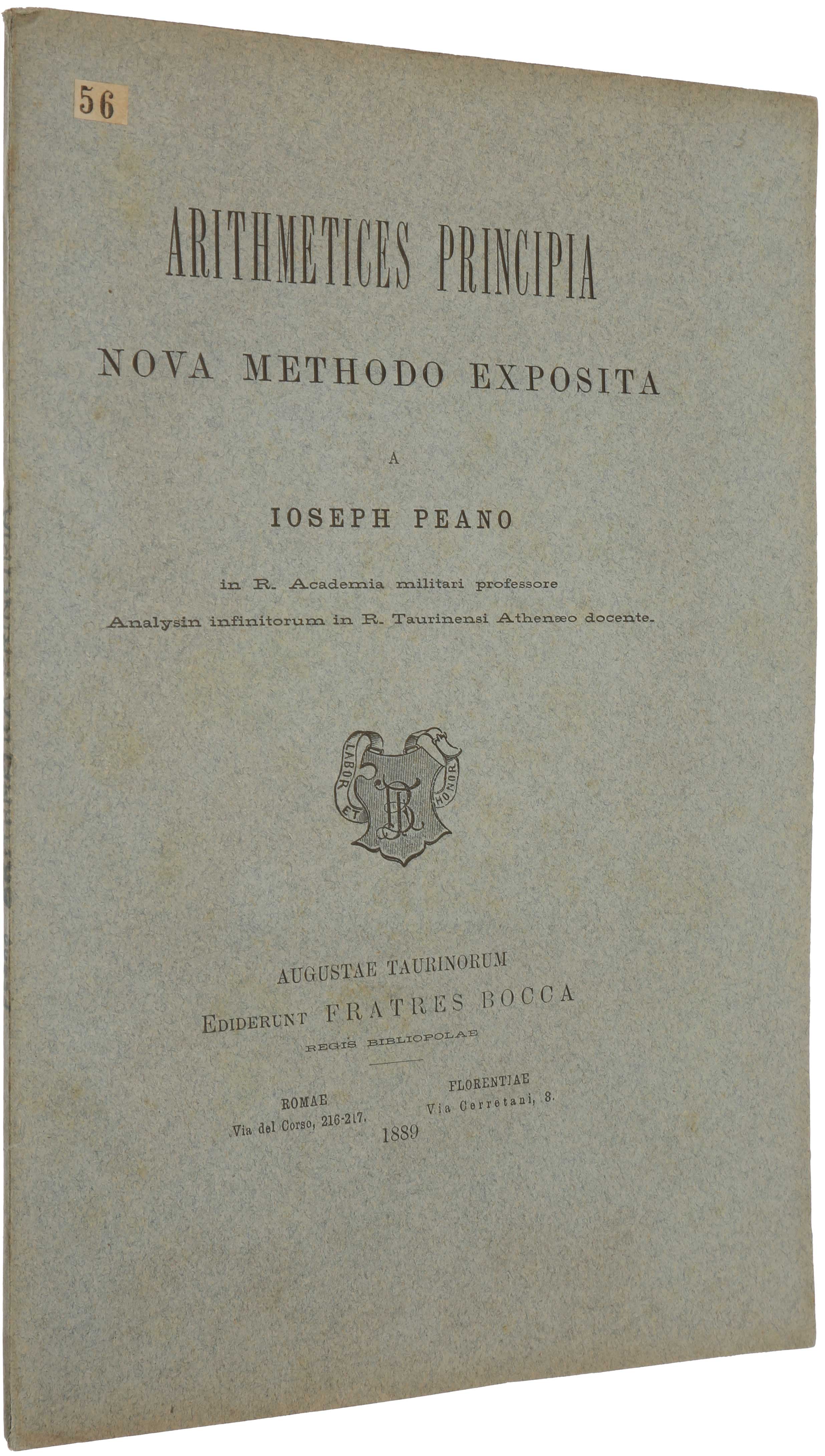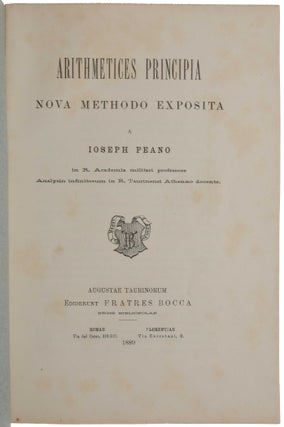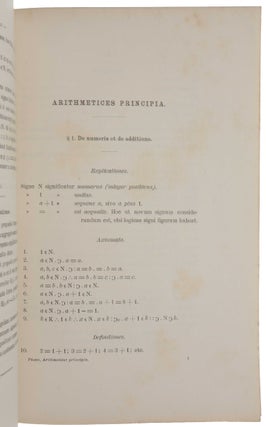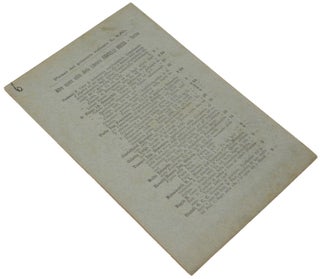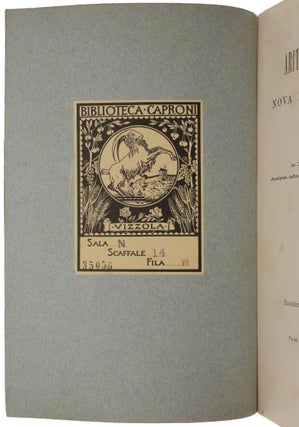Arithmetices Principia Nova Methodo Exposita.
Turin: Bocca Brothers, 1889.
First edition, and a fine copy in the original printed wrappers, of Peano’s most important work, which contains the first statement of the famous ‘Peano axioms’ for the natural numbers and which remains of seminal importance to mathematics and mathematical logic. “Peano’s most important contribution to the development of the theory and practice of the axiomatic method was his system of axioms for the arithmetic of the natural numbers… On the basis of his axiomatization, Peano constructed the entire theory of natural numbers. In particular, he showed how the elementary theorems of arithmetic can be obtained from his axioms” (Styazhkin, History of Mathematical Logic from Leibniz to Peano, 1969, pp. 278-9). “… with the publication of Arithmetices principia, nova methodo exposita, Peano not only improved his logical symbolism but also used his new method to achieve important new results in mathematics; this short booklet contains Peano’s first statement of his famous postulates for the natural numbers, perhaps the best known of all his creations. His research was done independently of the work of Dedekind, who the previous year had published an analysis of the natural numbers, which was essentially that of Peano but without the clarity of Peano. (This work was the only work Peano wrote in Latin.). Arithmetices principia made important innovations in logical notation, such as Î for set membership and a new notation for universal quantification. Indeed, much of Peano’s notation found its way, either directly or in a somewhat modified form, into mid-twentieth-century logic” (DSB). No copies listed on ABPC/RBH.
“Written in Latin, this small book was Peano’s first attempt at an axiomatization of mathematics in a symbolic language … after having introduced logical notations and formulas, Peano undertakes to rewrite arithmetic in symbolic notation. But he aspires to more than just the provision of a correct logical foundation for arithmetic: the book deals also with fractions, real numbers, and even the notion of limit and definitions in point-set theory… The initial arithmetic notions are “number,” “one,” “successor” and “is equal to,” and nine axioms are stated concerning these notions. Today we would consider that Axioms 2, 3, 4 and 5, which deal with identity, belong to the underlying logic. That leaves the five axioms that have become universally known as “the Peano axioms”… The ease with which we read Peano’s booklet today shows how much of his notation has found its way, either directly or in a somewhat modified form, into contemporary logic” (van Heijenoort, pp. 83-4). Peano’s axioms were subsequently modified and republished by their creator in the five successive versions of his Formulaire and finally perfected in Whitehead and Russell’s Principia Mathematica.
“Peano’s Arithmetices principia not only deals with the natural numbers. Having presented all of the basic arithmetical operations, Peano goes on to discuss several topics in order to ‘better show the power of this [new] method’. First he offers a selection of number-theoretical results (without proof, art. 7) and then he introduces the rational and the real numbers. The rationals are rendered as ratios of two natural numbers (art. 8), the reals as formal ‘limits’ of sets of rationals, essentially following Dedekind’s definition by means of cuts (art. 9) … Finally, art. 10 discusses basic results in the topology of the real numbers, belonging to the theory of ‘what Cantor calls Punktmenge (ensemble de points)’, on the basis of the concepts of interior, exterior and limit point. Some of these results were new” (Landmark Writings in Western Mathematics, 1640-1940, pp. 622-3).
Peano exerted a profound influence on Bertrand Russell and his work on the foundations of mathematics. “Principia Mathematica had its origins in Russell’s discovery of the work of Peano at the International Congress of Philosophy held in Paris in the summer of 1900, which Peano and his supporters attended in force. To that time Russell had been working for several years attempting to develop a satisfactory philosophy of mathematics. Despite some philosophical successes … a satisfactory outcome had always eluded him. At the conference, however, he very quickly realized that the Peano school had a set of techniques of which he could make use, and on his return from the conference he immediately set about applying them. As a result, he quickly rewrote The Principles of Mathematics, which he had started in 1899, finishing the new version by the end of the year. It was published, after some delay and substantial revisions of Part I, in 1903, billed as the first of two volumes. It was intended as a philosophical introduction to, and defence of, the logicist program that all mathematical concepts could be defined in terms of logic and that all mathematical theorems could be derived from purely logical axioms. It was to be followed by a second volume, done in Peano’s notation, in which the logicist program would actually be carried out by providing the requisite definitions and proofs. At about the same time that Russell was finishing The Principles of Mathematics, he began the collaboration with his former teacher, Whitehead, that produced, many years later, Principia Mathematica” (The Palgrave Centenary Companion to Principia Mathematica, p. xvi).
That this pamphlet was written Latin reveals a concern of Peano’s: international accessibility. It was so important to him that he later devoted much of his time to the cause of the auxiliary international language, Interlingua. “In his mathematical writing, addressed to mathematicians at large, Peano changed over early on from his own language of Italian to French, which is more widely known; but even French is not fully international, and he looked back with regret to the time, not so very distant, when Latin had been the universal language of scholars” (Kneebone, Mathematical Logic and the Foundations of Mathematics, 1963, p. 149). Kennedy (Life and Works of Giuseppe Peano, p. 41), however, suggests that both the title and the language of composition were acts “of sheer romanticism, perhaps the unique romantic act of his scientific career”. The Greek Arithmetices was perhaps meant to evoke Euclid, while Principia may have been a tribute to Newton. And writing in French, with which Peano was certainly familiar, would have made the book even more accessible to an international audience.
Giuseppe Peano (1858-1932) “became a lecturer of infinitesimal calculus at the University of Turin in 1884 and a professor in 1890. He also held the post of professor at the Academia Militare in Turin from 1886 to 1901. Peano made several important discoveries, including a continuous mapping of a line onto every point of a square, that were highly counterintuitive and convinced him that mathematics should be developed formally if mistakes were to be avoided. His Formulaire de mathématiques (Italian Formulario mathematico, “Mathematical Formulary”), published from 1894 to 1908 with collaborators, was intended to develop mathematics in its entirety from its fundamental postulates, using Peano’s logical notation and his simplified international language... Peano is also known as the creator of Latino sine Flexione, an artificial language later called Interlingua. Based on a synthesis of Latin, French, German, and English vocabularies, with a greatly simplified grammar, Interlingua was intended for use as an international auxiliary language. Peano compiled a Vocabulario de Interlingua (1915) and was for a time president of the Academia pro Interlingua” (Britannica).
DSB X: 442; Jean van Heijenoort: From Frege to Gödel. A Source Book in Mathematical Logic, 1879-1931 (this work contains an English translation, with introduction, of the Arithmetices Principia – the second work in the collection, after Frege’s Begriffsschrift).
8vo (240 x 159 mm), pp. [xvi], 20. Original printed wrappers, mostly unopened. Exlibris bookplate to inside of front wrapper. Manuscript lettering to spine strip. A fine copy.
Item #4539
Price: $16,500.00

